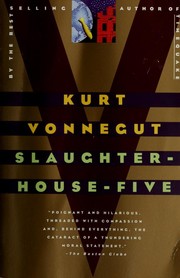Slaughterhouse Five was not what I expected. I imagined I would read a depressing story about the bombing of the German city of Dresden during WWII— using the same method as movie The Passion of the Christ, I thought the takeaway would be something like “war is terrible.”
What I didn’t expect was a dreamy, nonlinear based-on-a-true-story fiction about some American POWs, the main character of which isn’t even the author (who was in Dresden himself). Yet, I enjoyed this book nonetheless. This is my first Kurt Vonnegut book, and I can say he was an excellent writer.
I won’t pretend to be a literary master who can carve out some grand new meaning from this book, but I will share what I gathered. Kurt Vonnegut’s anti-war perspective seems to be something like this: sometimes, terrible things like war and death just happen. You can try to stop them— maybe you should try— but they will find a way. Vonnegut, who I think is projecting himself onto the Billy Pilgrim character, seems to have a dreamy non-response to these terrible things. We are to accept them as matters of life. The oft-repeated line in the book is simply “So it goes.”
Vonnegut puts it best himself, within the first few pages of the book:
Over the years, people I’ve met have often asked me what I’m working on, and I’ve usually replied that the main thing was a book about Dresden.
I said that to Harrison Starr, the movie-maker, one time, and he raised his eyebrows and inquired, “Is it an anti-war book?”
“Yes,” I said. “I guess.”
“You know what I say to people when I hear they’re writing anti-war books?”
“No. What do you say, Harrison Starr?”
“I say, ‘Why don’t you write an anti-glacier book instead?’ ”
What he meant, of course, was that there would always be wars, that they were as easy to stop as glaciers. I believe that, too.
And even if wars didn’t keep coming like glaciers, there would still be plain old death.
